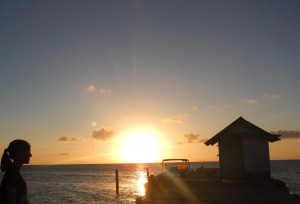This trip has been such an amazing experience. I registered for the EBIO 319 hoping about tropical ecosystems, conducting experiments in the field, and the country of Belize. This course far exceeded my expectations. I also learned about travel, troubleshooting, and how to feed yourself when Houston runs out of water, which I wasn’t anticipating but will surely come in handy in the future. More than that however, this trip has completely reaffirmed that I need to find a job that involves fieldwork. It’s difficult to explain, but I feel so complete hiking through the rainforest, surrounded by the buzz of countless birds, insects, and the occasional monkey, miles from human settlement. If I wasn’t flying back to the jungle tomorrow I think it would have been a bit of a culture shock to return to “normal” life.
I learned so much from the lectures and projects we worked on, but I also enjoyed the unstructured time where we were free to explore the amazing ecosystems around us. My favorite parts of the trip were 5 am walks through the jungle, kayaking through the mangroves, and late nights watching stars dart across the sky. My least favorite part was probably the pre-trip assignments, but I definitely see how helpful this preparation was in the field.
At first glance, the reef and the rainforest are vastly different ecosystems. There is almost no overlap between species, and the organisms have very different adaptations to their respective environments. However, I was amazed to see how much they had in common. Both ecosystems are incredibly diverse, in terms of species and microhabitats. Interestingly, while both ecosystems are full of life they are also very nutrient-poor and cycle nutrients very efficiently. Trees and coral colonies provide 3-dimensional structural diversity, and very different species reside in different layers of the forest and reef. When we went on night hikes and dives both ecosystems were nearly unrecognizable, and a completely different set of species revealed themselves.
In addition, I thought it was interesting how both sites managed their resources. Although Glover’s and Las Cuevas were situated in protected zones, both allowed selective removal of species. The US is a large and wealthy country, so we can afford to set aside large swaths of completely protected land in national parks. From an American perspective, it would be awesome if Belize could similarly isolate the Chiquibul. However, this forest covers 1/7 of the entire country, so it would be very difficult to isolate the forest without economic repercussions for the country.
Despite this removal of species, both areas are relatively pristine in comparison to their neighboring countries. Consequently, both struggle with people coming across the border to harvest resources—xaté palm in the chiquibul and illegal fishing in the attol. This also poses a difficult problem for the country. While they certainly want to secure their borders and protect their resources, arresting offenders will likely only worsen the problem. Most of these people are the primary providers for their families, and turning them away or arresting them could mean the starvation of their children.
I could go on for pages about everything I learned on this trip, but a few ideas really stood out to me. Conservation is an incredibly complicated problem, and we can’t barge into other countries with a single solution that will fix everything. A multitude of complex circumstances lead to the degradation of ecosystems, and many creative solutions will be needed to reverse or even slow ecosystem loss. I’ve wanted to do field research for many years, but before this trip I wasn’t quite sure what that would actually look like. Now, I can see how many of our pilot experiments could be expanded into long-term studies. Finally, this trip has definitely reaffirmed that I’m on the right path for my life. While my dreams for the future may change, I can’t imagine a life that doesn’t involve exploring nature, in whatever form that may take.

